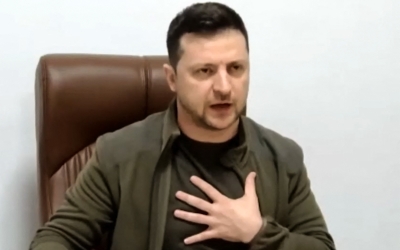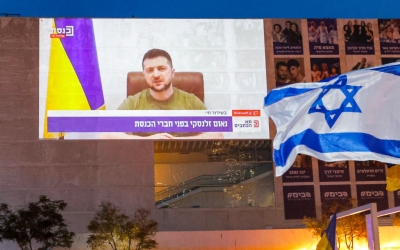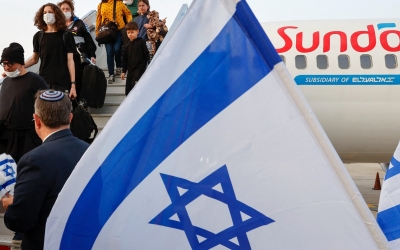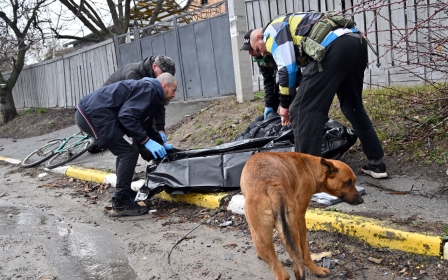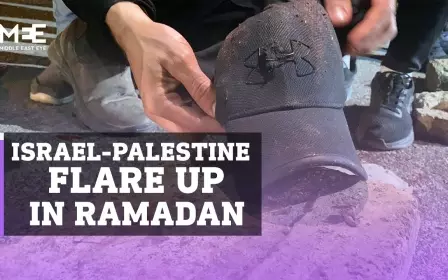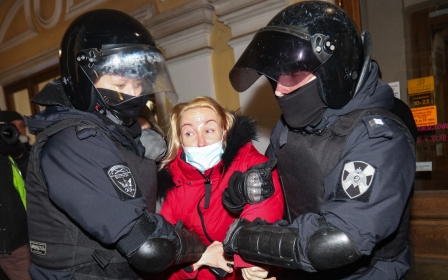Jews flock to eastern Europe to help Jewish Ukrainians flee the war
Chisinau and Palanca, Moldova - The gates of the Agudath Israel synagogue in Chisinau are wide open. Volunteers and Ukrainian refugees walk in and out as breakfast is laid out on a table in the courtyard.
Located in the heart of the Moldovan capital, the synagogue is one of six Jewish transit centres in the city, where refugees can get food, medicine, accommodation and transport.
Galina, a 74-year-old Ukrainian with Jewish roots, left her husband, a wheelchair user, in their hotel while she came to sort out their flight to Israel, where their extended family lives.
“Being a refugee is heartbreaking,” Galina told Middle East Eye.
Originally from Odesa, she is one of almost 20,000 Ukrainian Jews that the Israeli government expects to emigrate to Israel after escaping the carnage in Ukraine into neighbouring countries. Israeli Interior Minister Ayelet Shaked said last month the government is prepared to take up to 100,000 refugees, out of which it has 5,000 spots for non-Jewish Ukrainians.
New MEE newsletter: Jerusalem Dispatch
Sign up to get the latest insights and analysis on Israel-Palestine, alongside Turkey Unpacked and other MEE newsletters
Before the war started, some 350,000 Jews lived in Ukraine, the majority in the cities of Odesa, Kyiv and Dnipro.
As the first Russian tanks advanced in late February, Galina’s grandchildren called her and said: "If you don't come to us, we'll come and defend you there.”
“Only then did my husband agree to go,” she recalled.
Stood next to Galina was her new friend, Ludmilla, a woman with Jewish roots who left eastern Ukraine's Kharkiv and has been coming to the synagogue for food and guidance.
“Everything there is bombed, our life is destroyed, civilisation is destroyed, everything is destroyed,” the 77-year-old, who also hopes to go to Israel to live with her family, said.
Deep roots
Ukraine’s Jewish community has historically had a strong presence in the country, and President Volodymyr Zelensky is himself Jewish. Evidence of a large Jewish community in Ukraine dates back to the late 9th century.
The Jewish community in Ukraine constitutes the fourth largest in Europe and 11th largest in the world, according to estimates cited by the World Jewish Congress. Between 1917 and 1920, Yiddish was even declared a state language, along with Ukrainian and Russian.
Hasidic Judaism, an ultra-Orthodox branch of the religion, originates from western Ukraine, where it was founded in the 18th century.
Jewish inhabitants of southeast Europe are no strangers to escaping violence, with their ancestors having faced pogroms and antisemitic attacks a century ago in a places like Chisinau or Odesa, which were central to spurring the first Zionist movements before the Holocaust.
Because many US and Israeli ultra-Orthodox Jews have ancestral roots in Ukraine - and ancestors who have also fled persecution - many have dedicated time and effort to help fellow Jews flee from Russian bombs.
An estimated 300,000 Jewish immigrants living in New York come from the former Soviet Union. The largest group comes from Ukraine.
There are also important Hasidic religious sites in the country. Located in central Ukraine, the town of Uman sees tens of thousand of pilgrims passing through every year.
Because of these historical ties, and the widespread appreciation of Zelensky, Jews living across the Atlantic have organised quickly to establish an aid pipeline to Ukraine and its neighbouring countries, to which many are fleeing.
One of those places is Moldova, where aid and human resources have been funnelled to manage the large number of refugees, many of whom are Jewish.
Ari, a 19-year-old student from New York, was part of a group unloading food and clothes at Palanca, Moldova’s southern border crossing with Ukraine.
With Israeli and Polish roots, he is one of an estimated 200 volunteers to have come from the US and Israel to help Jewish refugees coming into Moldova. He’s put his studies on hold and has been volunteering for ultra-Orthodox group Agudath Israel in Moldova for about a month.
As refugees arrive from Odesa, just 40km away from Palanca, volunteers are not the only people waiting for them. The Israeli foreign ministry sent envoys to the border to greet Jewish Ukrainians coming into Moldova and to help them sort out their documents and visas for wherever they want to get to.
“I’ve been here for a week now, but there aren’t that many Jews crossing anymore,” Israeli envoy Eli told MEE at the border.
A safe haven
The first week of the war saw hundreds of Jewish refugees arrive in Chisinau. They were processed at one of the four hotels the synagogue rented in the city.
Michael Finckel, deputy director of Agudath Israel in Moldova, is one of the relief effort's organisers.
“We provide people with everything they need, from transport, food, accommodation and medicine,” he told MEE.
An umbrella organisation of ultra-Orthodox Jewish groups around the world, Agudath Israel in the US has raised more than $2m for Ukraine since the war started.
Agudath has been working in Moldova for over 30 years, with Rabbi Pinchas Zaltsman heading operations locally.
“We are motivated by the need, because we realised that there would be a large influx of people [coming from Ukraine],” said Finckel.
At one point, Finckel recalled, there were 500 people coming into Chisinau in one day. The director estimated that almost 20,000 people benefited from their help.
Many don’t have documents to travel to Israel and the consulate can’t keep up with the flow of people, as the waiting time can be up to 10 days.
The daily cost for food, accommodation and transport for Ukrainian Jewish refugees transiting Moldova exceeds $200,000, according to Uri Livshits, who manages the transport and reception of refugees at the synagogue.
The 43-year-old came from Israel to bring his parents from Dnipro to Chisinau on the 10th day of the war.
“We don't select between Jews and non-Jews, we help everyone and work closely with the mayor of Chisinau,” said Livshits.
Agudath Israel has become one of the main organisations receiving refugees and managing transit centres in Chisinau, with the help of hundreds of volunteers from the Moldovan, American and Israeli Jewish community.
“I found out about the synagogue through messaging networks. I’m not staying here, but I came to get food," said Dina, a Ukrainian Jewish refugee.
Medical support
Dina also benefited from medical help from the dozens of volunteer doctors, paramedics and psychologists that came to Moldova to help Jewish refugees.
Haverim L’Refuah, or Friends for Health, an NGO distributing medicine for people in Israel, told MEE it immediately expanded its work to Ukraine’s neighbouring countries when the war started.
Many elderly refugees like Galina and Ludmilla left in a hurry without taking their medicine with them. Some depend on daily pills and treatments for conditions such as high blood pressure or diabetes, and Haverim wants to make sure the refugees do not interrupt this.
“These are the kinds of medicines that if you don't take then your disease can become a silent killer,” said a Haverim representative.
With the help of United Hatzalah, a volunteer-based, rapid-response emergency organisation, they managed to deliver life-saving medicine to Moldova, Poland and Romania.
The organisation collects medicine in Israel that are is longer needed and then distributes it to people who cannot afford to regularly take their prescribed medicine.
Settler concerns
The Israeli government has been keen to participate in the diplomatic efforts to solve the war in Ukraine.
Israeli Prime Minister Naftali Bennett went to Moscow to hold talks with Russian President Vladimir Putin and also spoke with Zelensky.
While trying to position Israel as a mediator in the conflict - an unprecedented move for an Israeli head of state - Bennet has failed to condemn Russia’s aggression and has been criticised for not being tougher on Putin.
Many see it as hypocritical for the Israeli government to be involved in mediating between Russia and Ukraine as an occupier of territory itself.
Israel’s involvement in the conflict, either through its government or through its volunteers, also worries some Palestinians living in the occupied territories.
Palestinians fear that Jewish refugees coming into Israel could be settled in the occupied West Bank, further advancing Israel’s land-grabbing and settlement policies and contributing to what human rights organisations describe as apartheid.
Galina and Ludmilla first want to get to Israel, then they will decide whether and when they will return to Ukraine.
"My only wish is that no one would ever, ever go through what we went through," said Ludmilla.
Middle East Eye delivers independent and unrivalled coverage and analysis of the Middle East, North Africa and beyond. To learn more about republishing this content and the associated fees, please fill out this form. More about MEE can be found here.


